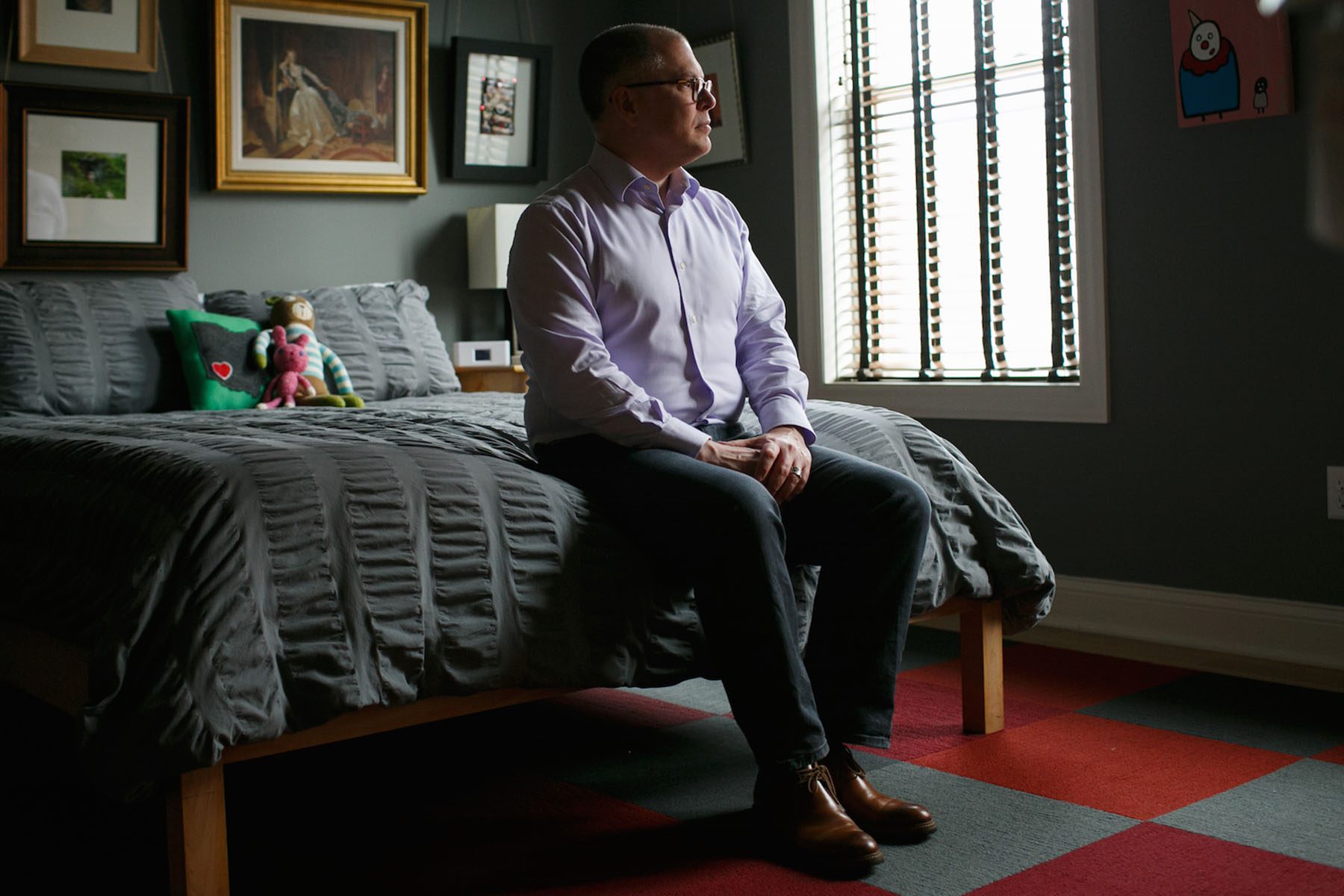Justine and TJ Price-O’Neil traveled hundreds of miles north to marry in 2010. But their home state of North Carolina did not legally recognize their marriage until 2014. Only then did all the unbearably delicate threads that had held their family together finally become strong enough to protect their future.
The couple had a daughter, Preston, in 2012. After Justine went part-time to focus on raising her, she lost her benefits — and without a legal marriage, wasn’t able to share TJ’s benefits. They paid at least a thousand dollars a month for fertility treatments to have their second child. The costs were literally and emotionally high.
At doctor’s offices, at work, Justine Price-O’Neil remembers getting skeptical looks whenever she referred to TJ as her wife — a look that said, “You know that doesn’t mean anything here.”
After a North Carolina federal judge struck down the state’s ban on gay marriage in the fall of 2014, less than a year before the Supreme Court federally guaranteed marriage equality in Obergefell v. Hodges, that title — and a decade spent sharing a life together — now meant something in the eyes of the law.
Justine Price-O’Neil, newly on her wife’s insurance alongside their daughter, now had lower copayments for fertility treatments. The money they saved could go toward Preston’s college fund. Then, once their son Jones was born, both women were both able to put their names on his birth certificate — an option that wasn’t possible at Preston’s birth.
Price-O’Neil remembers progressive, accepting friends, those who kept up with the issues, being surprised at how many battles the couple had to fight before their marriage was deemed legal by the state. Some didn’t believe it at first, and others had never realized how difficult it was.
LGBTQ+ people in the South know that they would be disproportionately affected if the U.S. Supreme Court were to overturn Obergefell. Nearly all Southern states have both constitutional amendments and state statutes banning gay marriage on the books, according to the Movement Advancement Project, which tracks LGBTQ+ policy. An end to Obergefell would mean queer Southerners would have to travel farther to get married and get protections given by the Respect for Marriage Act. Couples who spoke to The 19th also fear that losing Obergefell would embolden the kind of harassment thought to be in the past.
They also know that their homes and communities in the South are worth fighting for — and feel that the Respect for Marriage Act is a step in the right direction to ensure future generations have less of a fight on their hands.
After Roe v. Wade was overturned this summer, and after Justice Clarence Thomas suggested that the court should revisit Obergefell and other landmark cases, LGBTQ+ legal experts and many others grew nervous about marriage equality. That fear was strong enough to motivate Democrats and Republicans in Congress to reach an agreement to pass the Respect for Marriage Act.
The act, which was signed into law by President Biden on Tuesday, will offer limited protection to LGBTQ+ couples if the Supreme Court overturns Obergefell, requiring states to recognize the legality of gay marriages performed in other states. That means if a couple like the Price-O’Neils lived in a state where same-sex marriage was illegal, and traveled to another state to get married and then came home, their home state would be obligated to afford them the same rights as any other married couple.
Although the Price-O’Neils were excited to see the Respect for Marriage Act passed, and hope its protections will hold if needed, Justine noted that it means couples would have to have the money and time to travel and possibly stay out of state. Many LGBTQ+ people, who overall have a higher poverty rate than straight and cisgender people, may simply not be able to overcome those barriers.
Importantly, LGBTQ+ people who are already married in those states would still continue to be married if Obergefell were overturned.
Matthew Griffin and Raymie Wolfe also know what it means to be gay in the South and to fight for their relationship to be recognized for what it is — that it often comes with a feeling of isolation.
The couple, now living in New Orleans, have been together for 17 years and got married in Hamblen County, Tennessee, the day that Obergefell was overturned. They returned to the county clerk who had twice denied them a marriage license and held a ceremony later that day at a neighbor’s farm, where their judge was in the middle of shoeing horses.
That experience, as well as joining protests backing same-sex marriage in the years prior, showed them that they weren’t as alone as they thought.
“I was really struck by the level of support that we have. And I think that level of support really runs counter to the narrative that everyone gets about LGBTQ people in the South,” Griffin said. “There is much more support and acceptance than I ever thought there was.”
The couple had planned to get married in Tennessee once it was legal, since they had watched friends get married in other states and then come back home with zero rights attached to that union. But although they experienced an unexpected amount of support from their neighbors — and found community in protest of the state laws — the post-Roe political landscape has made them again reflect on the unique threat of being queer in the South.
If Obergefell were to be overturned, people in the South would face more burdens, Griffin said — more states would be able to return to not performing marriages for LGBTQ+ people, due to state bans against same-sex marriage that have remained in place since Obergefell, but have been unenforceable since the landmark 2015 ruling. That disproportionate effect highlights the need for continued advocacy in the region.

Justine Price-O’Neil worries that, even with protections from the Respect for Marriage Act in place, losing Obergefell would embolden the kind of homophobia that she experienced before her marriage was legal — and that it would be worse than before.
“Gay people would have to deal with more of that because people who are prejudiced and homophobic would feel validated in us losing that right. It would feel scary to live in a society like that again,” she said. In March 2016, the family had to move neighborhoods in North Carolina after a rock was thrown through their three-month-old son’s second-story window. He wasn’t sleeping in his room that night.
“There was glass all over his room as I went in there to change his diaper and I was like, OK, we need to get out of here. So we called our realtor that day, and went around and found the house that we’re in now,” Price-O’Neil said. “That was I think the scariest moment that we felt targeted for being gay since we had our kids.”
While the couple has discussed moving now that losing Obergefell seems possible, they still love where they live. TJ Price-O’Neil was born and raised in North Carolina — and there’s a reason that some people stay in the South, Justine said. Family is close by, winter isn’t bitter cold, there’s parks in the area, and they can drive to the ocean or the mountains in a few hours.
“We love living here,” Justine Price-O’Neil said. “We don’t want to leave. You don’t want to be forced to leave just to be able to have rights and to be able to raise your children in a place that respects you.”
Griffin ultimately believes that the politics of the region does not define what its people believe — and that public opinion on LGBTQ+ rights and gay marriage has changed, especially due to local advocates.
The history of people in the South advocating for their own civil and human rights — including queer people and people of color — should not be understated, said Kierra Johnson, executive director of the National LGBTQ+ Task Force. More time, money and resources need to be spent on advocacy in the South to move those civil rights forward for the long haul, she said — support that should continue beyond the Respect for Marriage Act.
“State and local organizations are debilitatingly underfunded,” she said. “We’ve got a lot of reparation to do, repairing to do. We’ve got to catch up with ourselves.”
Barbara Goldstein and Ann Willoughby have lived in the same house in Durham, North Carolina, for 34 years, after traveling to the state together for graduate school.
Although Goldstein and Willoughby, who have been together for 40 years, have settled in the South, home for a long time has just been wherever the other is.
They met in 1981 while working at a hospice organization in Michigan. When Willoughby, a recent divorcee, couldn’t afford the plane fare back from Dallas for a family trip, Goldstein volunteered to drive with her. She bought a tent and sleeping bags for an impromptu camping trip where the two friends, soon-to-be girlfriends, spent three or four days on the road together. Their first night was spent setting up the tent by their car lights at a KOA Campground off the interstate in Arkansas, listening to semi-trucks.
“We just went on with our lives from that point, and it was wonderful,” Willoughby said. They quickly moved in together. They traveled to New York in 2012 to get married.
“I don’t think people appreciate what it’s like to be gay in a red state,” Goldstein said. “I think that’s difficult. I don’t know that a lot of young people would choose to move to this area and stay here.” Although they know and like their neighbors, they feel like they live in a mostly liberal bubble compared with the rest of the state.
For a long time, the couple was too nervous to talk to Willoughby’s children — she had five — about their relationship. They regret that now.
“At the time, in the early 80s, it was just too scary to have that conversation. Ann was afraid that they would reject [her],” Goldstein said. They shared household and parenting duties, raising the kids — who are now middle-aged. At that time, living together in Michigan, they didn’t have any examples of how to talk with the children about their relationship.
“People just didn’t talk about it. It was generally a conservative state,” Goldstein said.
For Goldstein and Willoughby, the Respect for Marriage Act is an encouraging first step to protect LGBTQ+ people — but they hope that people won’t get complacent and think this law is enough.
The couple have three gay grandchildren, and they don’t want their grandchildren to have to fight to live normal lives, or have to share stories of what life was like when they weren’t able to get married. To finish the job that the Respect for Marriage Act started, protections should be passed that don’t require people to travel to another state to have their marriage recognized, Goldstein said. People in the South would be especially affected by such travel, she added.
“We want things to be different,” she said.











